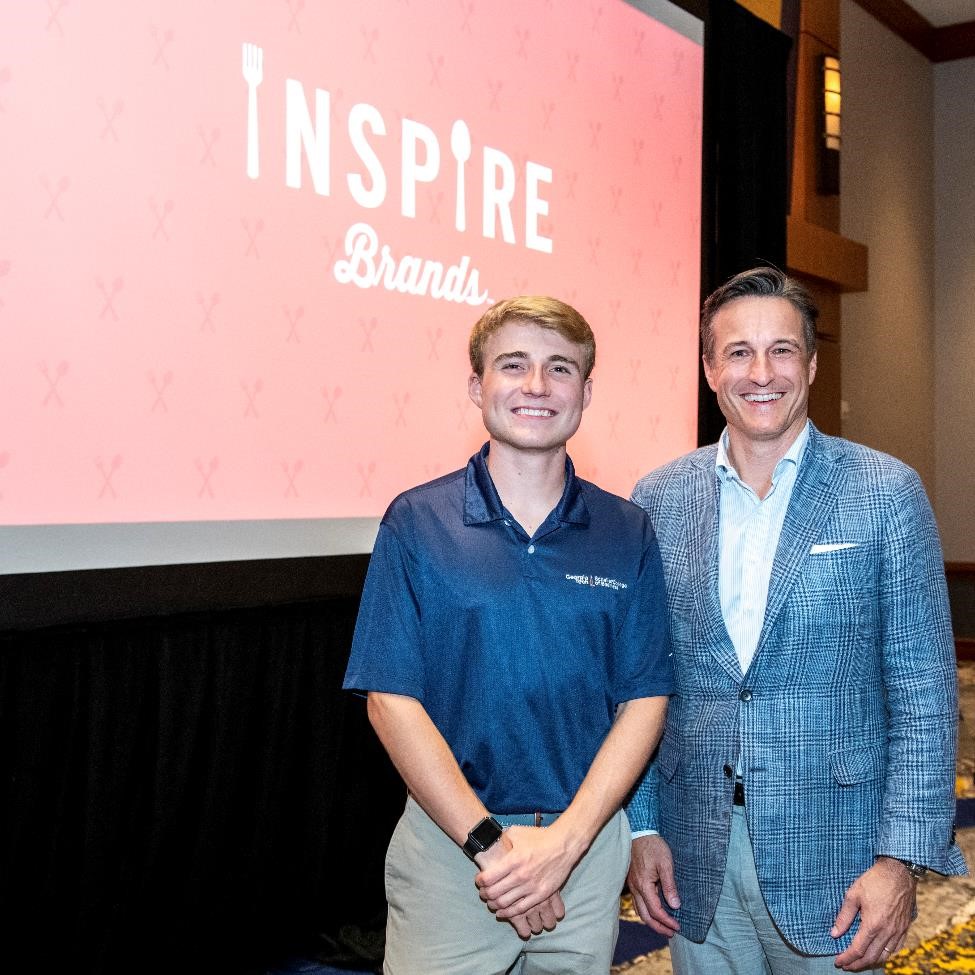We are pleased to introduce a new series where Scheller College of Business undergraduate students interview notable Scheller College alumni, CEOs, and prominent C-level executives, tapping into their business expertise, lessons learned during their time at Scheller, and more.
In the first of this series, Scheller second-year undergraduate, Cole Ormsby, interviews Scheller alumnus, Paul Brown (MGT ’89). The pair met earlier this year at Scheller’s 2018 Opening Bell, where Brown provided the keynote address.
Brown is co-founder and CEO of Inspire Brands, a multi-brand restaurant company whose portfolio includes more than 4,700 Arby’s, Buffalo Wild Wings, and Rusty Taco locations worldwide. Annual system-wide sales of the three brands exceeded $7.6 billion in 2017.
Brown’s previous work history includes: President of Brands and Commercial Services of Hilton Worldwide, where he led global brand management; President of Expedia.com and Expedia’s Partner Services Group; Partner at McKinsey & Company; Senior Vice President of Global Brand Services for InterContinental Hotels Group; and Manager at Boston Consulting Group in the firm’s Chicago and Atlanta offices.
A leader is someone who can get others on board, excite the team, recruit great people, and set a clear vision for the business.
He discussed his experiences as a student at Georgia Tech and the business school and what led him to the quick-service restaurant (QSR) business.
Q: What lessons or experiences from your time as an undergraduate at Georgia Tech impacted you most?
A: I was president of the Interfraternity Council (IFC), which leads and directs the fraternities on campus. I can honestly say that experience led me to confidently take on many of my future career roles.
Q: Was there a favorite class or faculty member that helped mentor you?
A: Yes; [Philip] Adler was definitely my favorite professor. He taught a senior-level general management class that I loved, and he was the first to introduce me to the Socratic Method. He had a no-nonsense teaching style, and it brought out a lot in me. I was very shy, but he taught me to open up and be vocal in thought.
Q: Do you have a favorite Tech tradition or memory?
A: Homecoming immediately comes to mind. The Ramblin’ Wreck Parade was always a great time around campus. Once, my fraternity brothers and I took a golf cart and turned it into a Flintstone float; we called it the “Flintstone Mobile!” We’d also dress up for games: khakis, white shirt, yellow tie, and a blue blazer. Times with my fraternity brothers were always memorable.
Q: After Georgia Tech, you worked with big-name companies such as the Boston Consulting Group and McKinsey & Company. What made you change careers from consulting to hospitality to the food industry?
A: My path from consulting to travel to hospitality to the food industry was nontraditional. In 1994, I worked for the Boston Consulting Group when the Internet started to change e-commerce. The manner in which companies sold and marketed their product was forever changed.
With each career change, I always placed myself in the shoes of the consumer to determine how to articulate brand promise and deliver. The food-service industry is really no different than hospitality; they each have multi-unit components, are service-oriented, and each are marketed in similar fashion. However, in hospitality, two different hotel brands will typically have the same operations teams while operating two different restaurant brands are usually very different.
Food service was an industry I knew I could leverage my previous experiences and be successful at delivering brand promise over profit.
Q: What motivated you to launch Inspire Brands (February 2018)?
A: The objective of starting Inspire was to build a family of powerful, distinct restaurant brands that each have high-growth potential, both domestically and internationally. Inspire was designed to enable each of our brands to benefit from and build off the strengths of the others, while at the same time keeping each in its own swim lane. Each brand has its own purpose, vision, values, strategy, and priorities. Our brands do not share advertising agencies, operations, nor culinary teams, as I think it’s important for each to have its own values and identity.
Q: How do you make expansion/acquisition decisions, most recently Sonic Drive-In?
A: We hope to close on the Sonic deal by the end of the year. (A good portion of Sonic’s management team are Tech graduates, actually!) But, first and foremost, it’s important to find the right companies when considering an acquisition. We look for those within a certain profit range, and we seek to find brands that are more unique, similar to our existing chains.
Q: In your opinion, what sets a businessperson apart from his/her colleagues? What traits define a successful businessman or woman?
A: A successful businessperson is able to draw firm and fast rules. A leader is someone who can get others on board, excite the team, recruit great people, and set a clear vision for the business. While it sounds quite simple, not everyone can do this.
Q: If you could give advice to current Scheller College of Business students, what would it be?
A: Try new things and use your time as a student to not be overly focused on your future career. Explore; take classes you wouldn’t ordinarily have and join new groups to meet new people. You will never have this time again!
